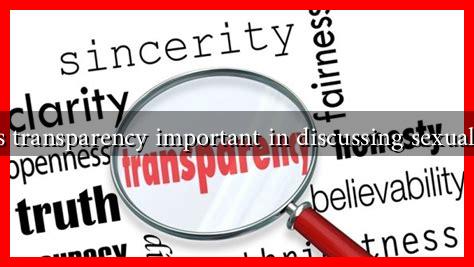-
Table of Contents
Why is Transparency Important in Discussing Sexual Issues?
In an era where conversations about sexual health, consent, and relationships are becoming increasingly prominent, the importance of transparency in these discussions cannot be overstated. Transparency fosters trust, encourages open dialogue, and ultimately leads to healthier attitudes and behaviors regarding sexual issues. This article explores the significance of transparency in sexual discussions, supported by relevant examples, statistics, and case studies.
The Role of Transparency in Education
Sexual education is a critical component of public health, yet it often suffers from a lack of transparency. Comprehensive sexual education programs that are open and honest about various topics can significantly impact young people’s understanding of their bodies, relationships, and consent.
- Informed Decision-Making: Transparent discussions about sexual health empower individuals to make informed choices. For instance, a study published in the Journal of Adolescent Health found that comprehensive sexual education led to a 50% reduction in teen pregnancy rates.
- Reducing Stigma: Open conversations about sexual orientation, gender identity, and sexual health can help reduce stigma. The Human Rights Campaign reports that LGBTQ+ youth who have access to inclusive sexual education are less likely to experience bullying and mental health issues.
Building Trust in Relationships
Transparency is essential in fostering trust within personal relationships. When partners communicate openly about their sexual desires, boundaries, and health status, it creates a safe environment for both individuals.
- Encouraging Consent: Clear communication about consent is vital. A study by the American Psychological Association found that couples who engage in transparent discussions about consent are more likely to have satisfying sexual experiences.
- Health Awareness: Transparency regarding sexual health, including STI status and contraception use, is crucial. According to the Centers for Disease Control and Prevention (CDC), open discussions about sexual health can lead to increased testing and prevention measures.
Addressing Societal Issues
Transparency in discussing sexual issues also plays a significant role in addressing broader societal problems, such as sexual violence and discrimination. By fostering open dialogue, communities can work towards solutions that promote safety and equality.
- Combatting Sexual Violence: Initiatives like the #MeToo movement have highlighted the importance of transparency in discussing sexual harassment and assault. By sharing their stories, survivors encourage others to speak out, creating a culture of accountability.
- Policy Changes: Transparent discussions can lead to policy changes that protect individuals from discrimination and violence. For example, the implementation of Title IX regulations in educational institutions has been influenced by increased transparency around sexual assault cases.
Case Studies and Statistics
Several case studies illustrate the positive impact of transparency in sexual discussions:
- Planned Parenthood: This organization has been at the forefront of providing transparent sexual health education. Their programs have led to a 30% increase in contraceptive use among teens in areas where they operate.
- University Programs: Many universities have adopted transparent sexual consent policies, resulting in a 25% decrease in reported sexual assaults on campuses, according to a report by the Rape, Abuse & Incest National Network (RAINN).
Conclusion
Transparency in discussing sexual issues is not just beneficial; it is essential for fostering informed decision-making, building trust in relationships, and addressing societal challenges. By promoting open dialogue, we can reduce stigma, combat sexual violence, and create a healthier society. As we continue to navigate the complexities of sexual health and relationships, embracing transparency will be key to empowering individuals and communities alike.


